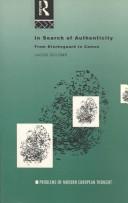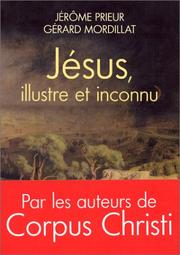| Listing 1 - 10 of 63 | << page >> |
Sort by
|
Book
ISBN: 9789004529076 9004529071 Year: 2023 Publisher: Leiden : Brill,
Abstract | Keywords | Export | Availability | Bookmark
 Loading...
Loading...Choose an application
- Reference Manager
- EndNote
- RefWorks (Direct export to RefWorks)
The studies in this volume go beyond the question of the authenticity of Prophetic narrations, which has occupied the field of Hadith Studies for over a century. By approaching hadith narrations and literature from various perspectives, the authors seek to uncover the potential that hadith material has to better understand the intellectual and social history of Muslim societies. Applying concepts and methods from other disciplines, the authors study the materiality of hadith collections, the places they were read, and the ways they were incorporated in architecture. Additionally, they explore understudied genres such as the forty-hadith, the 'fada'il', 'ahadith al-ahkam', and 'awali collections'. As such, they set a new course to push the field of Hadith Studies in a new direction.
Hadith --- Authorities. --- Evidences, authority, etc. --- Authenticité. --- Authenticité.
Book
Year: 1968 Publisher: : New York,
Abstract | Keywords | Export | Availability | Bookmark
 Loading...
Loading...Choose an application
- Reference Manager
- EndNote
- RefWorks (Direct export to RefWorks)
Authorship --- Authenticité --- Congresses --- Congrès
Book
ISBN: 9783869050188 Year: 2020 Publisher: Stuttgart Edition Axel Menges
Abstract | Keywords | Export | Availability | Bookmark
 Loading...
Loading...Choose an application
- Reference Manager
- EndNote
- RefWorks (Direct export to RefWorks)
The condition of 'fake' and 'real' in architecture is rarely publicly discussed nor has it encountered broad journalistic or scholarly attention. This book explores the realm of truth, authenticity and fakery in architecture, providing a timely collection of analytical essays and projects. Photographers, writers and architects share their understanding and speculations about a broad range of spaces and concepts - all searching for common ground between real and imagined, function and story. The authors challenge our perception of 'authenticity ' through the examination of built and simulated environments, architectural fiction, theatric illusions and mannerist trickery. They examine the notion that the principle of Sullivan's 'form follows function' contains a paradox caused by the ambiguity and complexity of architectural expression. Buildings are perceived through an individual's personal experiences while also being interpreted along broader cultural values. The works shown reveal that under scrutiny, any built environment harbors both, reveals moments of truth, deception and ambiguity--all of it partially in the eye of the beholder. The diverse contributions shed light on unexpected identities in architecture inviting critical thought about our built environment - analog and digital.0The goal of this publication goes beyond unmasking deception in architecture, it aims at unfolding time-lines and revealing the layered nature of people and places. The images and essays reveal our contemporary condition and let collective and individual narratives unfold, a range of truths in themselves. Expanding from the discussion about truthful materiality and tectonics, this book provides an understanding of real, authentic, and fake in urbanism and architecture.
Architecture --- architecture [discipline] --- authenticity --- Authenticité (art) --- Authenticité (philosophie) --- Néo-gothique (architecture) --- Philosophie

ISBN: 0415119472 Year: 1995 Volume: *5 Publisher: London New York Routledge
Abstract | Keywords | Export | Availability | Bookmark
 Loading...
Loading...Choose an application
- Reference Manager
- EndNote
- RefWorks (Direct export to RefWorks)
Authenticiteit (Filosofie) --- Authenticity (Philosophy) --- Authenticité (Philosophie) --- Ethics [Existential ] --- Existential ethics
Book
ISBN: 3518123157 Year: 2003 Volume: 2315. Publisher: Frankfurt am Main : Suhrkamp,
Abstract | Keywords | Export | Availability | Bookmark
 Loading...
Loading...Choose an application
- Reference Manager
- EndNote
- RefWorks (Direct export to RefWorks)
Hip-hop --- Subculture. --- Authenticity (Philosophy) --- Hip-hop --- Subculture --- Authenticité (Philosophie)

ISBN: 2220049108 9782220049106 Year: 2001 Publisher: Paris Desclée De Brouwer
Abstract | Keywords | Export | Availability | Bookmark
 Loading...
Loading...Choose an application
- Reference Manager
- EndNote
- RefWorks (Direct export to RefWorks)
Jésus-Christ --- Historicité --- Enseignement biblique. --- Judaïcité. --- Personne et fonctions --- Bible. --- Authenticité. --- Jésus-Christ --- Historicité --- Judaïcité. --- Authenticité.
Book
ISBN: 9781904982999 1904982999 Year: 2014 Publisher: London Archetype
Abstract | Keywords | Export | Availability | Bookmark
 Loading...
Loading...Choose an application
- Reference Manager
- EndNote
- RefWorks (Direct export to RefWorks)
What is the 'real thing' in cultural heritage? The papers in this book address the concepts of authenticity and replication for the interpretation, display and conservation of our cultural heritage. In the West the value placed on 'original' materials has been central to our understanding of cultural heritage. While advances in conservation science provide detailed information on the tangible properties of objects, there is a growing emphasis on the importance of their conceptual framework and the context in which they were created. Therefore, we have to consider the value of different ways of representing objects and debate whether one stage of their history should take precedence over others. In this context, the potential use of replication broadens the discussion on authenticity and brings about additional challenges - in what circumstances does a replica gain significance as another form of the 'real thing'? While the concept of authenticity continues to be one of the core factors driving decision making in conservation and interpretation, new approaches towards the display and use of collections are challenging conventions, making the roles of curators, conservators, art historians and conservation scientists increasingly complex. The papers in this volume address this dilemma and provide a platform for the continued discussion of this valuable and intriguing subject.
Sculpture --- Painting --- Conservation. Restoration --- conservatie --- preserving --- Applied arts. Arts and crafts --- Art --- Authenticity (Philosophy) --- Authenticité (Philosophie) --- Conservation and restoration --- Conservation et restauration --- Authenticité (Philosophie)
Book
ISBN: 9782070735075 2070735079 Year: 2006 Publisher: Paris : Gallimard,
Abstract | Keywords | Export | Availability | Bookmark
 Loading...
Loading...Choose an application
- Reference Manager
- EndNote
- RefWorks (Direct export to RefWorks)
Sciences exactes et sciences humaines sont, de nos jours, traversées par des conflits de vérité. Les uns, affichant leur attachement à la véracité, veulent crever les apparences pour atteindre les constructions et les motivations réelles qui se cachent derrière elles. Ainsi, l'ambition des sciences physiques de dévoiler la vérité serait infondée, eu égard aux forces de la société qui contrôleraient leurs activités : la sociologie de la connaissance serait mieux placée pour dire la vérité de la science que la science ne l'est pour dire la vérité du monde. A côté de cette exigence de véracité, il existe une défiance tout aussi généralisée à l'égard de la vérité : celle-ci existe-t-elle ou n'est-elle que relative, subjective? Le soupçon se porte alors particulièrement sur l'histoire : des récits, longtemps présentés comme exprimant la vérité du passé, sont dénoncés comme tendancieux, idéologiques, voire apologétiques. Mais les tentatives faites pour remplacer ces distorsions par "la vérité" se heurtent à leur tour aux mêmes objections. Car toute attaque contre quelque forme spécifique de vérité, historique ou autre, s'appuie sur des propositions qui demandent elles-mêmes à être considérées comme vraies. Les notions de vérité et de véracité peuvent-elles être refondées solidement afin que notre manière de comprendre la vérité, et les chances que nous aurions de l'atteindre, puisse répondre à notre besoin de véracité ? Bernard Williams, qui voit là un problème fondamental de la philosophie d'aujourd'hui, nous aide à sortir de ces dilemmes devenus impasses. Pour cela, il raconte une généalogie - celle qui aurait poussé l'humanité, dès ses premières formes d'organisation sociale, et jusqu'aux démocraties contemporaines, à donner consistance à deux grandes notions : l'exactitude et la sincérité. Ce livre n'a rien d'un traité dogmatique. Disciple de Socrate plus que de Kant, Williams, à l'heure où chacun voit le midi de la Vérité à la petite porte de sa communauté d'appartenance, nous invite à partager une vie commune. Car, cette fois encore, le philosophe tient que la seule question qui vaille n'est pas " Que dois-je faire? " mais "Comment vivre? ".
Truth --- Authenticity (Philosophy) --- Sincerity --- Truthfulness and falsehood --- Vérité --- Authenticité (Philosophie) --- Sincérité --- Vérité et mensonge --- Vérité. --- Mensonge --- Vérité --- Authenticité (Philosophie) --- Sincérité
Book
ISBN: 9781782389125 9780857454966 9780857454973 0857454978 1299777287 9781299777286 085745496X Year: 2013 Publisher: New York Berghahn
Abstract | Keywords | Export | Availability | Bookmark
 Loading...
Loading...Choose an application
- Reference Manager
- EndNote
- RefWorks (Direct export to RefWorks)
The longing for authenticity, on an individual or collective level, connects the search for external expressions to internal orientations. What is largely referred to as production of authenticity is a reformulation of cultural values and norms within the ongoing process of modernity, impacted by globalization and contemporary transnational cultural flows. This collection interrogates the notion of authenticity from an anthropological point of view and considers authenticity in terms of how meaning is produced in and through discourses about authenticity. Incorporating case studies from four continents, the topics reach from art and colonialism to exoticism-primitivism, film, ritual, and wilderness. Some contributors emphasize the dichotomy between the academic use of the term and the one deployed in public spaces and political projects. All, however, consider authenticity as something that can only be understood ethnographically, and not as a simple characteristic or category used to distinguish some behaviors, experiences, or material things from other less authentic versions.
Anthropology --- Authenticity (Philosophy) --- Anthropologie --- Authenticité (Philosophie) --- Philosophy. --- Philosophie --- #SBIB:39A3 --- Philosophy --- Antropologie: geschiedenis, theorie, wetenschap (incl. grondleggers van de antropologie als wetenschap) --- Anthropologie. --- Authenticité (philosophie)
Article
Abstract | Keywords | Export | Availability | Bookmark
 Loading...
Loading...Choose an application
- Reference Manager
- EndNote
- RefWorks (Direct export to RefWorks)
CANADA --- NOUVELLE-ORLEANS (LA) (ETATS-UNIS) --- AUTHENTICITE CULTURELLE --- JAZZ --- TOURISME --- MONTREAL --- FESTIVALS --- CANADA --- NOUVELLE-ORLEANS (LA) (ETATS-UNIS) --- AUTHENTICITE CULTURELLE --- JAZZ --- TOURISME --- MONTREAL --- FESTIVALS
| Listing 1 - 10 of 63 | << page >> |
Sort by
|

 Search
Search Feedback
Feedback About UniCat
About UniCat  Help
Help News
News